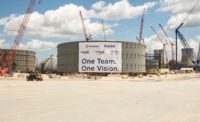Editor's Note: 3/14 - This article was edited to clarify the explanation of the direct construction schedule performance index used in the project owner's latest report.
Plant Vogtle’s new nuclear units may become operational considerably ahead of the schedule that Georgia Power announced last fall when Bechtel officially took over the beleaguered project. While the target in-service dates for Units 3 and 4 officially remain November 2021 and November 2022, respectively, the utility told state regulators that current construction progress indicates a possible seven-month improvement over that timeline, accelerating those dates to April 2021 and April 2022.
The forward adjustment in the construction schedule—though tentative—marked some additional good news for the Vogtle nuclear expansion, which faced sharp criticism from state project monitors—and a recommendation for termination—as recently as this past December.
Instead, in its 18th Vogtle Construction Monitoring (VCM) report, filed Feb. 28 to the state Public Service Commission, Georgia Power details “improved productivity levels” achieved at the project since the 2017 bankruptcy of Westinghouse Electric Co., the previous prime contractor. The utility’s report covers the period of July 1, 2017, to Dec. 31, 2017.
Last August, Georgia Power announced that Bechtel would replace Fluor, the former construction manager. At the same time, the utility updated the in-service dates to November 2021 and November 2022. The new schedule marked a roughly 29-month extension of the previous targets of 2019 and 2020. Originally, Georgia Power had planned to have Units 3 and 4 operational in 2016 and 2017, respectively.
Since Westinghouse’s bankruptcy filing last March, the utility reported that contractors have logged more than 12 million worker-hours without a lost-time injury. Moreover, Georgia Power stated, “Productivity improved after Southern Nuclear Co. assumed overall project management of Vogtle Units 3 and 4.”
While generally crediting the project management of Bechtel—which is working under a cost-reimbursable-plus-fee arrangement—the utility indicated varying degrees of success in productivity improvement. Using a cost performance index (CPI) to measure direct construction efficiency, the report noted that the project team is currently spending more time than planned to complete a task.
Reporting a direct construction CPI rate “15-20% above the plan,” the VCM noted: “Bechtel is implementing plans to improve work performance, with a focus on minimizing travel time, late starts, early quits and increasing tool time.”
Measured by a direct construction schedule performance index (SPI), the “project is currently earning more hours than planned,” says the report. According to Georgia Power, the SPI index used in the VCM report has a scale where a rate of 1.0 or higher indicates less progress than planned, with a rate below 1.0 reflecting more progress than planned. According to the latest filing, the Vogtle project’s SPI generally improved over the reporting period, says Georgia Power, trending from roughly 1.4 in July 2017 to an estimated 0.55 rate by December.
Total project completion remains more than four years away, and challenges and risks remain, the latest VCM notes.
For instance, both Southern Nuclear and Bechtel “continue their engagement with the national labor unions to ensure sufficient resources are available to achieve the accelerated schedule. Through leadership and oversight, the labor force must be able to maintain and, in some areas, improve productivity. Additionally, efforts remain to reduce project risk by realigning work scope at key vendors and drive consistency in work-process across the project,” the report stated.
Georgia Power’s report noted: “The forward-looking projections are subject to change pending project performance, engineering changes, resequencing of activities and potential lessons learned from the Chinese AP1000 projects.”
As of January 2018, construction was estimated to be 48.5% complete. The utility also estimated the project’s overall status at 65.6% complete, with engineering work 99.6% complete and procurement 85.7% complete.





Post a comment to this article
Report Abusive Comment